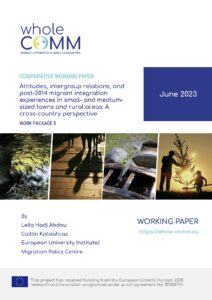This comparative working paper reports on the analysis of the Whole-COMM survey on public opinions on the integration of refugees from outside Europe and Ukraine to four European countries: Austria, Germany, Italy and Sweden. It also summarizes the key findings of a pilot integration policy index, MIPEX-L whose result are analysed in relation to the typology of the localities selected by the project as well as the survey results sampled from these localities in an attempt to link attitudes and policies.
The main goal of the analysis on public opinions on integration was to find out whether there are differences in public opinions between people living in big cities and small and medium-sized towns and rural areas. We found minor differences by type of municipality. Slightly more people living in small and medium towns and rural areas (SMsTRA) think that migrants only are responsible for their own integration; and more people living in cities perceive tension and hostility in the relationships between refugees from non-EU countries and long-term residents. Previous studies show that there is a correlation between attitudes towards immigration and opinions on integration. In line with these studies, we found consistently more favorable opinions towards the integration of Ukrainians compared to refugees from outside Europe, not only regarding integration outcomes but also concerning relationships between long-term residents and the two refugee groups analysed, and how they should be supported by policy provisions. Furthermore, we investigated if there are country-level differences in public opinions towards integration and found that these are overall the most favourable in Italy and the least favourable in Austria. Our regression analysis also reveals that daily interactions with refugees from outside Europe in sports and cultural activities enhance people’s likelihood of considering refugees as well integrated, suggesting that leisure activities foster better connections.
The results from the analysis of the local level policy indicators show the variation in policies even in the same national contexts, and illustrate how policy frameworks are closely linked with experience diversity, structural development/material capabilities of the localities and political affiliations of elected localities. Finally, we explored the linkages between integration policies and public attitudes in the selected localities sampled in the public opinion survey and probed the plausibility of a potential effect: favourable integrational policies seem to go hand in hand with favourable opinions of refugees as well as lesser differentiation across Ukrainians versus refugees from outside Europe.
In conclusion, by focusing on views on integration rather than migration, this paper contributes to a limited body of literature on this topic. It introduces MIPEX-L, a pilot index of local migrant integration studies, providing a comparative analysis of policies across Whole-Comm localities. This deliverable adds valuable insights to the ongoing debate on the nexus between integration policy and public opinion, drawing connections between survey data and expert assessments of local migration policies.


